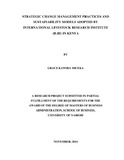| dc.description.abstract | As the world’s environment becomes increasingly complex and changing, strategic management is used by today’s corporations as one way to make the environment more manageable. A firm cannot afford to follow intuitive strategies once it becomes large, has layers of management, or its environment changes substantially. The attainment of an appropriate match or fit between an organization’s environment and its strategy, structure, and processes has positive effects on the organization’s performance. The International Livestock Research Institute (ILRI) works to improve food security and reduce poverty in developing countries through research for better and more sustainable use of livestock. ILRI has undergone changes to its Strategy in order to remain competitive. The purpose of this study was to find change management and sustainability models for International Livestock Research Institute. The approach used in this study was a case study. Data collected was qualitative by use of interview guide. Content analysis was used for the data analysis. The study found that ILRI was under pressure to effect change in the organization. This was necessitated by major changes in the environment that it operates in. These changes included but not limited to climate change, lack of funding and gender equity. ILRI had to come up with new strategies to ensure that its operations were commensurate with environmental changes to ensure sustainability of the organization. The study found that recent developments in new science and technologies offer new ways to make rapid progress in tackling livestock challenges in the developing world. This was one of the drivers of urgency for change at ILRI. Also, recent developments in new science and technologies offer new ways to make rapid progress in tackling livestock challenges in the developing world. The study found that ILRI developed a new strategy for the period 2013–2022. It incorporated several changes from the previous strategy, moving from a focus on livestock as a pathway out of poverty to a broader agenda that addresses poverty and food security in ways that are environmentally sustainable, good for human health and nutrition, and equitable. The study also found that as part of the change program, ILRI management also adopted a risk management policy in 2012. The policy was designed to provide guidance to ILRI staff on implementing an institute wide risk management process. In addition, the study found that ILRI management came up with a partnership strategy and management system as part of its change management process. The study found that the above strategies were developed on the back of consultations and review of the success of earlier strategies. The researcher concluded that the changing environment in terms factors affecting agriculture such as climate change was the primary reason of the change program at ILRI. The researcher also concluded that the change program at ILRI observed various models of strategic change such as Kotter’s eight step to successful change model and Lewin’s change management model. The researcher recommended that all organizations should be alive to the changing environment and implement strategic change where necessary. The researcher also recommended that organizations implementing change should adopt one of the many models of strategic change to ensure effectiveness of the change program. | en_US |

